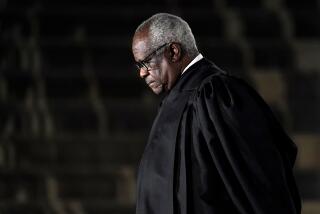Ethics Panel Tentatively Drops 15% Ceiling on Outside Income
- Share via
WASHINGTON — While confirming that honorariums to government officials should be banned, a presidential ethics commission on Tuesday tentatively backed away from an earlier decision that senior government employees’ outside income should be limited to no more than 15% of salary.
The 15% ceiling, which the commission agreed on in an earlier session, would have been in line with limits now applied to executive branch employees, but would have represented a sharp cut for others. Members of Congress now can keep outside income amounting to up to 30% of salary. For senators, the maximum is 40% of salary. In contrast, members of the federal judiciary face no limit on outside income.
Ultimately, the board gave tentative support to commission member R. James Woolsey’s suggestion that the panel’s report should note that current caps on outside income vary, and should advocate that “whatever (the new maximum) ends up being should be the same” for all.
‘Senior’ Level Unclear
The commission members did not specifically define where the cutoff for “senior” officials would be--the lowest salary level to which the cap would apply. They have suggested it could begin with those earning slightly less than $67,000 a year. Members of Congress are paid $89,500 annually.
In the last two days of hearings before it sends its report to President Bush, the commission also favored extending the one-year ban on lobbying by former executive branch employees to cover also those who leave Congress and the judiciary.
The panel suggested prohibiting disclosure of tightly defined information gleaned while in government service, but indicated it would not support felony penalties for violation of such a rule.
The commission, which Bush appointed in the first days of his Administration, foundered on the pay issue after a broad dispute over exceptions to the rule arose.
Commission member Lloyd Cutler, a Washington lawyer who served as counsel to President Jimmy Carter, argued that judges and other federal employees should be allowed to pursue careers in teaching and other outside fields.
“If the next Ernest Hemingway is someplace in the Internal Revenue Service and wants to write a book at night, all he can get out of that book is 15% (of his government salary),” Cutler complained. He presented a long list of potential outside occupations that included raising roses, breeding horses and writing popular songs.
But his stand was criticized by former Atty. Gen. Griffin Bell, who suggested the nation did not need a worker corps of song writers. “If you want to be a judge, you ought to be a full-time judge,” said Bell, a former appellate court judge. “You’re not in slavery. You can leave.”
In the meetings leading to its expected March 9 report to the President, the commission has sought to tighten ethical standards without risking a loss of brainpower in the government.
“We’re going to lose the brightest minds that we’ve got,” commission chairman Malcolm R. Wilkey, a retired federal judge, lamented during the outside-income debate.
In its recommendations, the commission Tuesday reflected governmental discomfort over the scandals and inquiries that have swirled around past and present federal officials.
In its lobbying recommendations, for example, the commission said a former employee of one section of the executive branch should not be allowed to lobby officials in other executive branch agencies for one year after he or she leaves government service.
More to Read
Get the L.A. Times Politics newsletter
Deeply reported insights into legislation, politics and policy from Sacramento, Washington and beyond. In your inbox twice per week.
You may occasionally receive promotional content from the Los Angeles Times.










